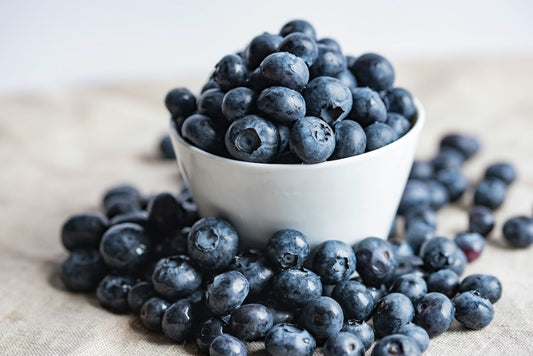The gut flora, also known as the gut microbiota, consists of a wide variety of bacteria, viruses and fungi that live in our intestines. These microorganisms play an important role in our health, especially in the health of our intestines.
A healthy gut flora contributes to efficient digestion, a strong immune system and even our mental health. In this blog post, we will focus on the benefits of oats for the gut and how they can help improve bowel health.
Porridge for a healthy intestinal flora
The role of nutrition in intestinal health
A balanced diet plays a significant role in promoting intestinal health. The condition of our intestines is strongly influenced by the food we eat. A conscious and healthy diet is therefore essential to support the optimal functioning of the intestines and to prevent possible intestinal complaints.
Gut health is of great importance because the gut is responsible for absorbing nutrients, fighting pathogens and regulating the immune system. However, an unbalanced diet with too little fiber and too many processed foods can lead to a shift in the microbiome, the totality of microorganisms in the gut, and thus impair gut health.
To promote gut health, you should focus on a varied and high-fiber diet. Dietary fiber is an indigestible carbohydrate found in fruits, vegetables, whole grains, legumes, and nuts. It serves as food for the good intestinal bacteria and helps maintain a healthy intestinal flora. They also promote regular digestion and help to soften stools.
Dietary fiber and their importance for the gut
Dietary fiber plays a crucial role in the health of our gut. They are non-digestible carbohydrates found in plant-based foods such as fruits, vegetables, whole grains, legumes, and nuts. These fibers are of great importance for healthy bowel function and help maintain a balanced intestinal flora.
Dietary fibers have several positive effects on the intestines. Firstly, they promote digestion and regulate bowel movements. Due to their ability to bind water, they increase the stool volume and thus facilitate passage through the intestines. This can prevent constipation and improve overall intestinal health.
Secondly, dietary fiber serves as food for the good bacteria in the intestines. Our intestinal flora consists of a variety of microorganisms that play an important role in digestion and metabolism. By fermenting fiber from these bacteria, they produce short-chain fatty acids, which in turn promote the health of the intestinal mucosa and reduce inflammation in the intestines.
In addition, fiber can help regulate blood sugar levels and reduce the risk of chronic diseases such as diabetes, heart disease and colon cancer. It contributes to satiety, which in turn can help maintain a healthy weight.
To reap the benefits of fiber, you should make sure to incorporate enough high-fiber foods into your diet. These include whole grain products such as oats, quinoa, and whole wheat bread, as well as a variety of fruits and vegetables. It is recommended that you consume at least 25-30 grams of fiber daily to support gut health.
Fiber for a healthy diet - read more!
Oats as a high-fiber food
Oats are an excellent source of fiber and offer numerous benefits for intestinal health. They contain both soluble and insoluble fiber, which play an important role in maintaining healthy digestion and balanced intestinal flora.
The high fiber content in oatmeal is particularly beneficial for gut health. Fiber increases stool volume, thereby promoting regular digestion and the removal of waste from the body. It can prevent constipation and improve overall bowel function.
In addition, fiber has a positive effect on the intestinal flora. It serves as food for the good bacteria in the intestines, which are important for healthy digestion and a strong immune system. The fermentation of fiber in the intestines leads to the production of short-chain fatty acids, which promote the health of the intestinal mucosa and can reduce inflammation in the intestines.
Oats are versatile and can be used in many different dishes. Whether as a base for a high-fiber muesli, as an ingredient in smoothies, or as the main ingredient in a nutritious porridge, there are countless ways to incorporate oats into your diet.
Prebiotics: Food for the good gut bacteria
Prebiotics play a crucial role in promoting healthy intestinal flora. They are special types of dietary fiber that serve as food for the good bacteria in the intestines. By selectively promoting the growth and activity of these beneficial microorganisms, prebiotics contribute to balanced intestinal health.
The importance of good gut bacteria for our health cannot be underestimated. They aid digestion, help with the absorption of nutrients, strengthen the immune system and protect against harmful microorganisms. By promoting the growth of these bacteria, prebiotics can help maintain healthy bowel function.
Some common sources of prebiotics are certain fruits, such as bananas and apples, and vegetables like onions, garlic, and artichokes. These foods contain special fibers like inulin and oligofructose that act as prebiotics. In addition, oat flakes are a natural source of prebiotics.
The benefits of prebiotics are manifold. They can help restore the intestinal flora by promoting the growth of healthy bacteria and inhibiting harmful bacteria. In addition, prebiotics can increase the production of short-chain fatty acids, which promote intestinal health and have anti-inflammatory properties.
Prebiotic porridge - discover it now!
Oats as a natural source of prebiotics
Oats are not only high in fiber, but they are also a natural source of prebiotics. Prebiotics are special dietary fibers that promote the growth and activity of good bacteria in the gut, thus helping to maintain a healthy intestinal flora.
The high content of prebiotics in oats, especially in the form of beta-glucan, makes it a valuable addition to a balanced diet. Beta-glucan is a soluble fiber that ferments in the intestines, producing short-chain fatty acids. These fatty acids serve as food for the beneficial bacteria in the intestines, thus supporting their reproduction and activity.
The prebiotics in oat flakes have numerous health benefits. They promote a healthy intestinal flora, support digestion and strengthen the immune system. In addition, they can help lower cholesterol levels and reduce the risk of heart disease.
The use of oats in your diet is versatile. You can use them as a base for muesli, porridge, or smoothies. They can also be easily incorporated into baked goods such as bread, cookies, or bars. By eating oats regularly, you can benefit from their prebiotic effects and support the health of your gut.
Oats are the perfect breakfast food
Probiotics: Good bacteria for your gut
Probiotics are live microorganisms, especially bacteria, that can have a positive effect on gut health. These “good” bacteria help maintain a healthy gut flora and are crucial for good digestion and a strong immune system.
The intestinal flora consists of a variety of bacteria that live in our intestines. A healthy balance of these bacteria is crucial for intestinal health. Probiotics support this balance by promoting the growth and activity of good bacteria while inhibiting the growth of harmful bacteria.
The benefits of probiotics for the gut are many. They can improve digestion by helping to break down nutrients and promoting the absorption of vitamins and minerals. Probiotics can also help regulate bowel movements and prevent constipation or diarrhea.
Some common sources of probiotics are fermented foods such as yogurt, sauerkraut, kefir, and kimchi. These foods contain live cultures of good bacteria that can colonize the gut and have beneficial effects. Probiotics are also available in supplement form.
Breakfast for healthy digestion
Oats and probiotic effects
Oats are not only high in fiber and a natural source of prebiotics, but there is also evidence that they may have a probiotic effect. Probiotics are live microorganisms, especially bacteria, that can have a positive effect on gut health.
Although oats themselves do not contain probiotics, they can serve as food for the good bacteria in the gut, thus promoting their growth and activity. The prebiotics in oats, especially beta-glucan, act as food for the existing good bacteria in the gut and can help to increase their numbers.
Furthermore, oats can support the survival and activity of probiotic bacteria when consumed together. Probiotics are sensitive to stomach acid and digestive enzymes, but oats can serve as protection and enable probiotic bacteria to pass through the gastrointestinal tract intact and settle in the intestines.
Prebiotic porridge – discover it now!
Gut health and oats: the research results
In recent years, research has intensively investigated the potential of oats for gut health. Numerous studies suggest that regular consumption of oats can have positive effects on the gut.
One study, published in the journal Nutrients, found that consuming oatmeal can improve gut health by increasing the number of good bacteria in the gut. The fiber in oatmeal, particularly beta-glucan, promotes the growth of beneficial bacteria and helps maintain healthy gut flora.
Another study, published in the journal Gut, examined the influence of oatmeal on digestion. The results showed that oatmeal can help regulate bowel movement and prevent constipation. This is due to the high fiber content of oatmeal, which promotes normal bowel function.
Furthermore, a study published in the Journal of Nutrition found that regular oatmeal consumption can reduce the risk of inflammatory bowel disease. The antioxidant properties of oatmeal can reduce inflammation in the gut and help alleviate symptoms.
These research findings suggest that oatmeal is a valuable addition to a healthy intestinal flora and good digestion. By promoting the growth of good bacteria, preventing constipation and reducing inflammatory processes in the intestines, oatmeal can contribute to overall intestinal health.
Oatmeal in your diet: tips and recipes
So you don't have to worry about how to incorporate oatmeal into your diet, we've got you covered with the best oatmeal recipes.
Oatmeal breakfast with strawberries – super tasty!
Oats for breakfast are not only super tasty, but also healthy. Oats offer a lot of healthy benefits for your body. They give you the energy you need, keep you full for a long time and provide you with the nutrients you need for a successful day. You can create really great recipes with oats. You can find one of them here and many more on our website. Enjoy!
Preparation time 5 mins.
Total time 5 mins.
Servings: 1
Calories: 330 kcal
Ingredients
- 40 g rolled oats
- 180 ml plant-based drink
- 15 g coconut flakes
- 100 g strawberries
Preparation
- First, take a bowl and add the rolled oats and the plant-based drink.
- Then mix in the coconut flakes and stir everything together well.
- Then put the oatmeal breakfast in the fridge for about 3 hours or overnight.
- When the oats have risen in the liquid, take the bowl out of the fridge.
- Next, puree a few strawberries and pour them over your overnight oats.
- Now you can refine the overnight oats with toppings of your choice. For example, you can use nuts, various seeds such as flaxseed, psyllium husks (psyllium seed husks) or chia seeds, and of course fruit.
Nutritional information
Calories: 330 kcal
Oats and gut health – a summary
Oats have been shown to be a valuable food for gut health. Their fiber-rich composition, including beta-glucan in particular, helps to promote healthy intestinal flora. The prebiotics in oats nourish the good bacteria in the gut and promote their growth. This supports optimal digestion and the regulation of bowel movements.
In addition to the prebiotic effect, oats may also have a probiotic effect. Although they do not contain probiotics themselves, they serve as food for the good bacteria in the intestines and can support their survivability and activity. The combination of oats with probiotic foods may enhance the positive effects on intestinal health.
The research shows that regular consumption of oats has positive effects on gut health. They help to build a healthy gut flora, improve digestion and can reduce the risk of inflammatory bowel disease.
To reap the benefits of oats for gut health, you should consume oats regularly as part of a balanced diet. You can enjoy them in the form of porridge, overnight oats, smoothies or as an ingredient in baked goods.
It is important to note that oats may not be suitable for everyone. If you have any intolerances or allergies, you should consider using alternative grains. It is recommended that you consult a doctor or nutrition expert to take into account individual needs and possible interactions with other foods or medications.
Overall, oats offer a natural and versatile way to promote gut health. With their high-fiber, prebiotic and possibly probiotic properties, oats are a healthy addition to your diet to support optimal gut function and good digestion.
Frequently asked questions
Is oats good for your gut?
Yes, oats are good for the gut. Oats contain a considerable amount of fiber, especially beta-glucan. This fiber has a positive effect on gut health.
What is the healthiest way to eat rolled oats?
The healthiest way to eat oats is to cook them with water. This way, you avoid unnecessary calories and additives. You should also pay close attention to the toppings you choose. Ideally, you should top your porridge with fresh fruit to start the day healthily.
Are oats good for irritable bowel syndrome?
Oats can be a good choice for people with irritable bowel syndrome (IBS) because they are easy to digest and high in fiber. The soluble fiber in oats, especially beta-glucan, can help regulate stool and alleviate the symptoms of IBS such as bloating, abdominal pain, and diarrhea.
Are oats good for inflammation of the bowel?
Oats may be beneficial for inflammatory bowel diseases such as Crohn's disease or ulcerative colitis. Due to their high fiber content and anti-inflammatory properties, they can help alleviate symptoms.
Are oats good for the stomach?
Yes, oats are good for the stomach. They are easy to digest and can help alleviate stomach discomfort. Oats contain soluble fiber, especially beta-glucan, which binds water in the stomach and forms a gel-like substance. This substance helps to calm the stomach and regulate the digestive process.
Which is more digestible – oats with water or milk?
The digestibility of oats with water or milk varies from person to person. Some people prefer to prepare oats with water, as this is a lighter and less rich option. Water gives the oats a soft consistency and accentuates the grain's natural flavor. On the other hand, many people choose to prepare oats with milk because it gives a creamier flavor and richer texture. Milk, whether it's cow's milk, plant-based milk alternatives, or yogurt, can provide additional nutrients such as protein, calcium, and vitamin D.
What is good for the gut?
Foods high in fiber, probiotics, prebiotics, drinking enough water, managing stress, and eating a balanced diet are all good for the gut. Everyone is different, so it's important to determine the right diet for your specific needs.
























